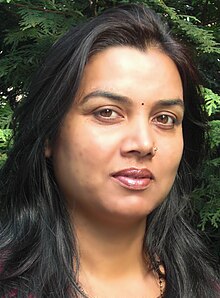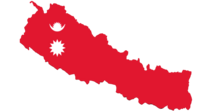Geeta Tripathee
Geeta Tripathee | |
|---|---|
 Poet Geeta Tripathee | |
| Born | 28 June 1972 Kharelthok, Nepal |
| Occupation | Poet, Songwriter |
| Nationality | Nepali |
| Education | PhD in Nepali Literature |
| Alma mater | Tribhuvan University |
| Notable works | Nrishamsha Parkhalharu Simalko Geet |
| Notable awards | Padmakanya Gold Medal (2000) Best Lyricist Award (2008)[1][2] |
| Spouse | Yadavraj Tripathee[2] |
| Children | Samip Tripathee[2] |
| Parents | Bedraj Thapaliya (Father) Ramadevi Thapaliya (Mother) [3] |
Geeta Tripathee (Template:Lang-ne; born 28 June 1972) is a Nepali poet, lyricist, essayist, literary critic and scholar. An eminent writer in Nepali, Geeta Tripathee has two volumes of poetry collection, one of lyrical poems and seven books in other literary genre to her credit. She also writes for newspapers on issues concerning women, environment and societal injustice.[4][2][5][6][7]
Geeta Tripathee is the recipient of 'Padmakanya Gold Medal - 2000', conferred by the Government of Nepal. She received 'Best Lyricist Award' in 2008 from 'Sanskritik Sansthan', the major cultural adjunct of Nepal Government.[1]
Early life
Geeta Tripathee was born on June 28, 1972 in Kharelthok, Kavrepalanchok to an educator Bedraj Thapaliya and Ramadevi Thapaliya. She completed her high school education in Kharelthok in 1988, and moved to Kathmandu for further education. Tripathee joined Padma Kanya Multiple Campus in Kathmandu and graduated in 1993. She married to Yadavraj Tripathee in 1989 while studying in Padmakanya college. Tripathee continued her study and completed her Master's degree in Nepali literature in 1998 with a gold medal by becoming the University topper. After completing her master's degree, she started teaching the subject of her interest and choice in different colleges under Tribhuvan University and Purbanchal University. Tripathee kept her writing carrier continued during her college days and afterwards. Later, she earned PhD in Nepali literature from Tribhuvan University in 2017.[3][2][4]
Career
Geeta Tripathee is a multi-genre writer. She has written two books of poetry, one book of lyrical poems, one book of essays and several books on literary criticism.[8]
Geeta Tripathee's works are translated into other languages like English, Hindi, Japanese and Korean; and are published in notable literary journals abroad. Tripathee has taken part in numbers of national and international literary events as a poet, presenter and speaker. Tripathee participated in South Asian Literature Festivals organized by Foundation of SAARC Writers and Literature in New Delhi in 2010 and 2017 as Nepali delegate poet.[9][10][11][12][13][14]
Works

Books
- Thunga Banfulka (2005)(Collection of lyrical poems)[4][2]
- Dui Haraf Othharu (2008) (Collection of lyrical poems) (co-written with poet Manjul)[4]
- Nrisamsha Parkhalharu (2009) (Collection of lyrical poems)[4]
- Ma Eklo Ra Udaas Ustai (2014) (Collection of essays)[2]
- Simal Ko Geet (2015) (Collection of lyrical poems)[14]
- Drishtibicharan (2009) (Literary criticism)[8]
- Kriti Bishleshan : Prayogik Aayam (2010) (Literary criticism)[8]
- Bishwanari Nepali Sahitya : Parampara ra Prabriti (2015) (Literary criticism)
- Nepali Mahila Lekhan : Prabriti ra Yogdaan (2015) (Literary criticism)
- Nepali Niyatra : Siddhanta ra Prayog (2017) (Literary criticism)
- Paryawaran ra Narikendri Samalochana (2018) (Literary criticism)
Music Album
Awards
- Padmakanya Gold Medal
- Best Lyricist Award
See also
References
- ^ a b Prof. Dr. Madhav Prasad Pokhrel, ed. (2018), "Geeta Tripathee", जगदम्बा नेपाली साहित्यको बृहत् इतिहास [Jagadamba Comprehensive History of Nepali Literature], Madan Puraskar Trust
- ^ a b c d e f g h i खनाल, सुनीता (February 16, 2019). "कहाँ हुन्छ मिलन त्यसै भाग्यमै नलेखेपछि". nayapatrikadaily.com. Retrieved April 10, 2020.
- ^ a b Prof. Dr. Kumar Prasad Koirala, ed. (2010), "Geeta Tripathee", प्रज्ञा नेपाली समालोचक कोश [Academy's Directory of Nepali Literary Critics], Nepal Academy, p. 84, ISBN 9789937723091
- ^ a b c d e Lila Luitel (2012). "Women Poets in Nepali Poetry". नेपाली महिला साहित्यकार [Nepali Women Literati]. Kathmandu: Shabdartha Prakashan. p. 215. ISBN 978-9937248051.
- ^ Tripathee, Geeta (2008), कृति विश्लेषण: प्रायोगिक आयाम, Ratna Pustak Bhandar ISBN 978999338836
- ^ Geeta, Tripathee (2018). "गहन पर्यावरणको सैद्धान्तिक अवधारणा Gahan Paryavaranko Saiddhantik Awadharana". Tribhuvan University Journal. 32 (2): 281–294. doi:10.3126/tuj.v32i2.24724.
- ^ Tripathee, Geeta (March 21, 2020). "तर किन मान्छेबाटै भयो यस्तो भूल..." nayapatrikadaily.com. Retrieved April 23, 2020.
- ^ a b c Lila Luitel (2012). "Women Writers in Nepali Literary Criticism". नेपाली महिला साहित्यकार [Nepali Women Literati]. Kathmandu: Shabdartha Prakashan. p. 215. ISBN 978-9937248051.
- ^ "Geeta Tipathee". Foundation of SAARC Writers and Literature. Retrieved April 17, 2020.
- ^ Tripathee, Geeta. Kalpna Singh-Chitnis (ed.). "Geeta Tripathee: Translated by Mahesh Paudyal". Translated by Mahesh Poudyal. Life and Legends. Retrieved April 9, 2020.
- ^ Tripathee, Geeta (March 1, 2015), Daine Smith (ed.), "Mid-Life Thoughts", Snow Jowel (6), translated by Bindesh Dhakal, USA: Grey Sparrow Press: 13, ISSN 2157-3646
- ^ K. Satchidanandan & Ajeet Cour, ed. (2011), The Songs We Share, Foundation of SAARC Wirters and Literature, pp. 32, 216, ISBN 978-8188703210
- ^ Acharya, Aparajita (April 8, 2015). "What Teacher Wants from Their Students". The Himalayan Times.
- ^ a b Tripathee, Geeta; Subedi, Abhi (2015), "The Road above Flowers (Preface)", Simalko Geet, Sabdahaar Creations, p. 3, ISBN 9789937895828
External links
- 1972 births
- Living people
- People from Kavrepalanchok District
- People from Kathmandu
- Nepali-language poets
- Nepalese women poets
- Nepalese lyricists
- Lyric poets
- Nepali-language writers
- Nepalese songwriters
- 20th-century Nepalese poets
- 20th-century women writers
- 21st-century Nepalese poets
- 21st-century Nepalese women writers
- Nepali-language lyricists
- Nepalese women short story writers
- Nepalese short story writers
- Literary translators
- Tribhuvan University alumni
- Literary scholars
- Women literary critics
- Female critics of feminism
- Nepalese literary critics
- Shankar Lamichhane scholars
- Padma Kanya Multiple Campus alumni


